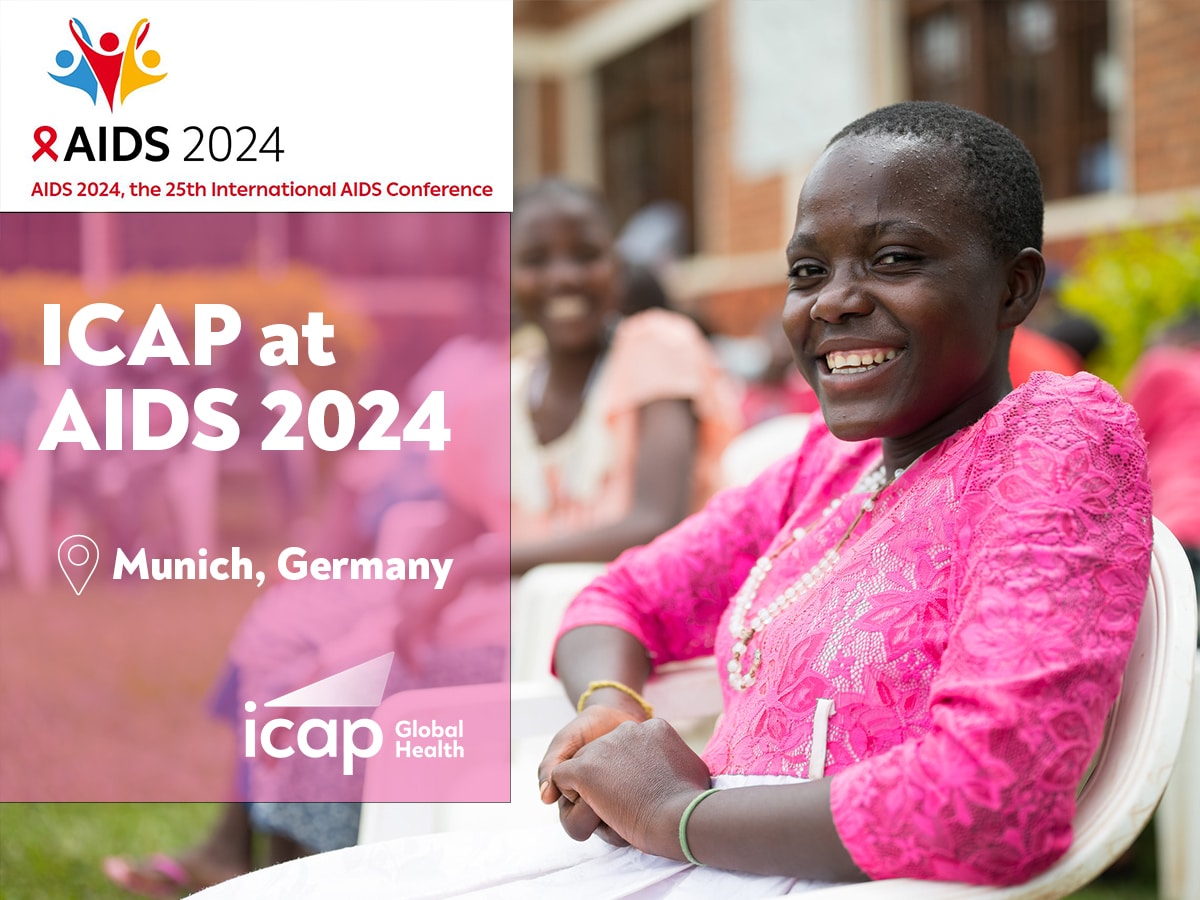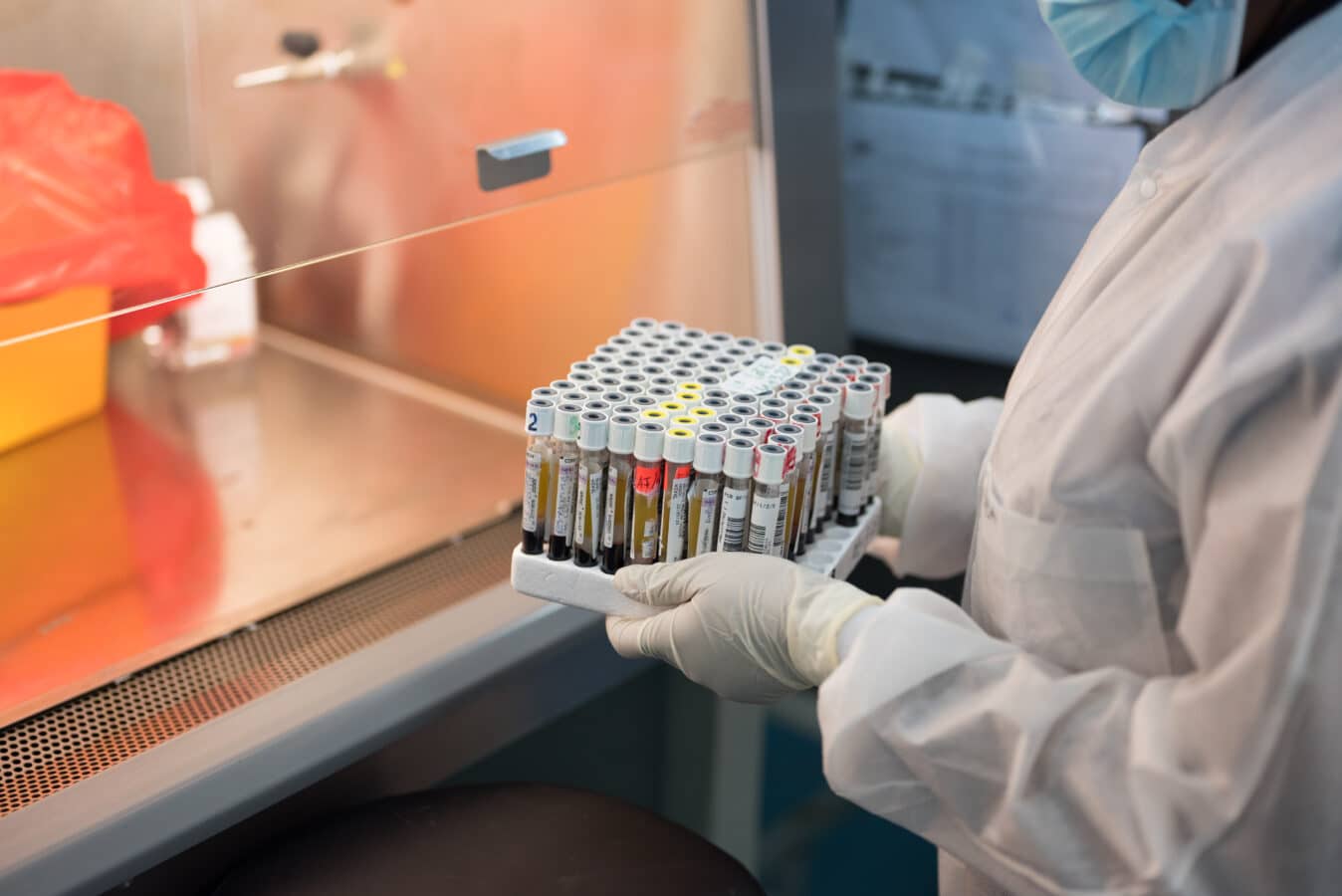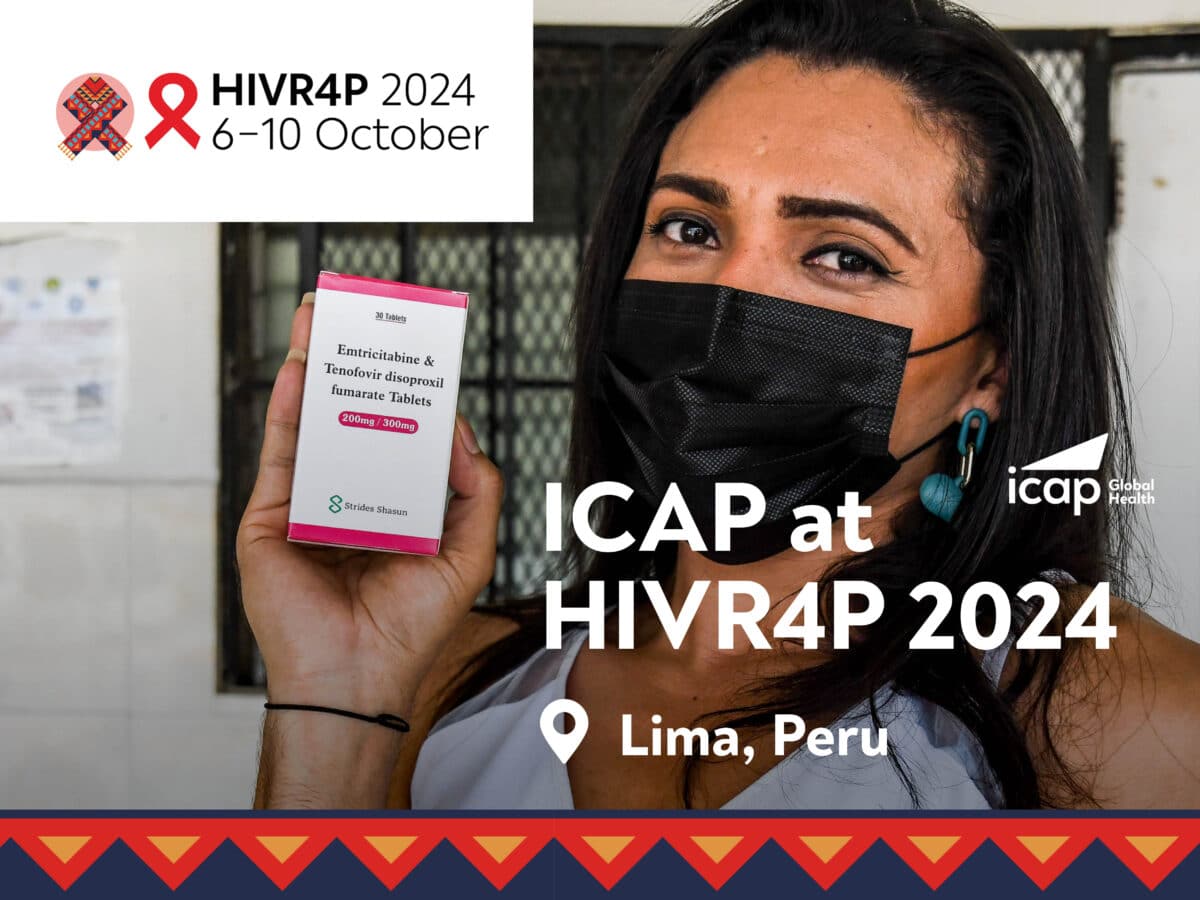-
Date: July 22-26, 2022
-
Location: Munich, Germany
At the world’s foremost conference on the global HIV response, ICAP experts will present a wide range of research in HIV prevention, care, and treatment from studies conducted around the world. Please see below for a summary of ICAP’s presence at the AIDS 2024, the 25th International AIDS Conference (July 22-26, Munich, Germany).
Click for AIDS 2024 conference information
Click for ICAP listings in the online conference program
All times listed are CEST (Central European Summer Time).
Satellites
Evidence based approaches to an integrated and sustainable HIV response – what do we know, what works, where are the key priorities and knowledge gaps?
22 July 11:30 am – 12:30 pm
WHO will convene a session on integration and sustainability for HIV response where the evidence, priorities, operational approaches to integrated service delivery and unresolved issues are discussed from the perspective of implementors, donors, communities, and researchers. The aim is to contribute to an evidence-based discussion on integration and sustainability approaches, that will build on protecting the response so far, while highlighting key areas where shifts are supported and feasible. The session will also leverage and reflect on good practice in countries, aiming to understand the mechanisms by which change was brought about, including on the changes in financial and governance aspects. At the same time, the session will also invite reflection on what are some potential risks and challenges that require further understanding and collaboration to resolve.
The specific objectives are:
1. To develop a shared understanding on what is meant by integration and what role it plays in ensuring sustainability from the perspective of donors, governments, and communities.
2. To present the achievement of Member States in advancing integration on HIV and other communicable disease and outline existing challenges in implementing integrated people centered services to end diseases and achieve UHC.
3. Share viewpoints from partners and civil society on integration in the context of a primary health care approach and identify opportunities for collaborating more with WHO and partners.
4. To understand what evidence and communities of implementation research teach us in support of integration.
ICAP Presentation
Keynote: Perspectives on Integration and Sustainability – lessons from 20 years implementing HIV programmes
Wafaa El-Sadr, MD, MPH, MPA, global director, ICAP at Columbia University and executive vice president, Columbia Global
11:35 am
For more information on this session, click here.
Launch of WHO antiretrovirals in pregnancy research toolkit
24 July 12:00 – 13:00 pm
The WHO and the International Maternal Paediatric Adolescent AIDS Clinical Trials Network (IMPAACT) support greater inclusion of pregnant women and breastfeeding in clinical trials and call for all stakeholders to accelerate research in pregnancy for new HIV agents. During the satellite, WHO and IMPAACT will present a new toolkit for research in pregnancy and breastfeeding, that provides access to guidance, research documentation (e.g. protocols, case report forms, etc) and other resources relating to the inclusion of pregnant and breastfeeding women in clinical and research studies and surveillance programmes. The satellite is aimed at research networks, national HIV programmes, affected communities, innovator companies and regulatory agencies so that interested parties can openly access, use and adapt the resources to their needs and support optimal antiretroviral drug choices in pregnancy.
Chair: Elaine Abrams, MD, senior research director, ICAP at Columbia University
ICAP Presentation
Including pregnant women in ARV research: No time to lose ! A new framework for accelerating the study of new drugs for HIV in pregnant and breastfeeding women
Elaine Abrams, MD, senior research director, ICAP at Columbia University
12 pm
For more information on this session, click here.
Symposium
Use of long-acting injectable cabotegravir in pregnant and lactating people
25 July 10:30 – 11:30 am
In 2022, the World Health Organization (WHO) recommended long-acting injectable cabotegravir (CAB) for use as pre-exposure prophylaxis (PrEP). This was supported by data from two large randomized controlled trials. CAB is one of the first in a pipeline of long-acting or extended delivery (LAED) agents that could have a significant impact on high HIV incidence rates globally. However, as countries plan for CAB introduction, data on the safety and pharmacology of CAB in pregnant and lactating people are limited, presenting a challenge for programmes. Historically, pregnant and lactating people have been excluded from trials of novel antiretrovirals. More recently, there has been a growing recognition of the need to include pregnant and lactating people in research with adequate protection and monitoring. This is to ensure that data on safety, efficacy and pharmacology of new antiretrovirals in pregnancy is available and that access to these medications is not delayed for pregnant and lactating people.
Co-Moderator: Elaine Abrams, MD, senior research director, ICAP at Columbia University
For more information on this session, click here.
Global Village
Nursing Networking Zone
The Association of Nurses in AIDS Care (ANAC) is hosting the Nursing Networking Zone in the Global Village (space HT01). It’s a space for nurses & nurse allies to get together, relax and learn from each other. They are hosting an interactive talk each day presented by subject experts with a time for dialogue & networking with attendees. The dialogue will include nurses’ roles in the topic, and they hope for a wide range of participants and perspectives: other members of the health care team, advocates and community members.
ICAP Presentation
PURPOSE1: Long-Acting PrEP Injectables for Young Women – How Do We Scale Up?
Monday, 22 July – Noon – 1 p.m.
Led by Susan Michaels-Strasser, PhD, MPH, RN, FAAN, Senior Director, Human Resources for Health (HRH) Development, ICAP at Columbia University
For more information, click here.
Posters (with ICAP Researchers listed)
Access to HIV Viral Load Testing Services in Underserved Security Prone Settings of Taraba State in Nigeria
— Timothy Nathaniel Yakubu, Chidiebere Ihesiaba, George Aneke, Oluwafunmike Olude, Chinyerem Immanuel, Musa E. Shabi, Adewale Akinjeji, Ruby N. Fayorsey
Scale-up of viral load access in Panama: ensuring leadership and high-quality testing delivery
— Rolando Lorenzana Gonzalez, C. Vargas, L. Peñalba, R. Mendizabal
Prevalence of HCV and HIV/HCV Co-infection among people who inject drugs in six sites in Kyrgyz Republic in 2021 – findings from respondent-driven sampling surveys
— M. Tursunbekov, G. Esenkeldieva, V. Ivakin, A. Deryabina
Progress towards UNAIDS’s 95-95-95 targets among People Who Inject Drugs (PWID) and Men Who Have Sex with Men (MSM) in six Kyrgyz Republic sites, 2021
— M. Tursunbekov, G. Esenkeldieva, V. Ivakin, A. Deryabina
Exploring differentiated HIV service delivery for men who have sex with men in Africa: a Kenyan qualitative study
— Jennifer Zech
Sexual risk behavior among people living with HIV not virally suppressed in Lesotho
— Abigail Greenleaf, Suzue Saito
Prevalence and correlates of HIV-related stigma among people living with and without HIV in Lesotho
— Kavitha Ganesan, Felix Ndagije, Wafaa El-Sadr, Andrea Low
Tuberculosis prevalence, incidence, and mortality in the CoVPN 3008 (Ubuntu) Covid-19 vaccine trial among predominantly people living with HIV in East and Southern Africa
— Harriet Nuwagaba-Biribonwoha
Toward key population-friendly services: defining tailored approaches for men who have sex with men in Kenya
— Jennifer Zech
Opportunity for differentiated service delivery to improve PrEP retention among MSM in Kenya
— J. Walimbwa1, J.M. Zech
Exploring differentiated HIV service delivery for men who have sex with men in Africa: a Kenyan qualitative study
— E. Mwore, J. Walimbwa, J. Zech
Results of the CombinADO Implementation Science Study, a multicomponent, youth-focused, youth-informed intervention to improve viral suppression among adolescents and young adults living with HIV in Mozambique
— E.J. Abrams, A. Zerbe, J. Falcao, E. Pimental de Gusmao
Condom use among sexually active men who know their HIV status: findings from the 2022 cross-sectional Kenya Demographic and Health Survey (KDHS)
— T. Kupamupindi
Scaling-up HIV self-testing to enhance case finding in Central Asia
— A. Deryabina, V. Ivakin, Z. Tatkeyeva, G. Esenkeldieva, S. Yusufbekova, N. Ryapolova, A. Howard
High HIV prevalence among people reporting non-injecting drug use requires a more inclusive approach to HIV prevention
— A. Deryabina, Z. Tatkeyeva, V. Ivakin, M. Sauranbayeva, M. Myrzaly, A. Howard
High vertical transmission rate among HIV-exposed infants up to 9 months of age born to newly identified breastfeeding women tested at the Well-Child clinic: results from a pilot in Mozambique
— E. Gusmão Pimentel, K. Ngale, A. Uaeca
The emergence of HIV treatment opportunity deserts in Malawi
— Andrea Low
PrEPing to end the HIV epidemic: describing PrEP need and missed opportunities for HIV prevention using five population-based surveys from Southern Africa, 2019-2021
— Sarah Wallach, M.R. Lamb, S.M. Farley, A. Low, J. Justman, N.M. Philip, H. Nuwagaba-Biribonwoha
“Go Back to Your Country”: trials and tribulations of accessing healthcare in South Africa for cross-border Lesotho-South Africa male and female migrant workers
— A.A. Howard, A. Low, F. Ndagije, M. Lethoko, Y. Hirsch-Moverman
Scale up of pre-exposure prophylaxis (PrEP) in facility-based HIV prevention services in El Salvador
— T. Rivera, A. Morales, O. Villalobos, C. Galindo, J. Franks, R. Mendizabal-Burastero
Progress towards the UNAIDS 95-95-95 targets and population HIV viral load suppression among female sex workers and sexually exploited girls in six major towns in Zambia
— N. Philip, L. Chelu, L. Chilukutu, H. Chung, T. Dzinamarira, G. Reid
Determinants of persistent low-level viremia among HIV recipients of care in three Nigerian States: a retrospective cohort study
— T.N. Yakubu, R. Oladigbolu, G.B. Obasa, F. Emerenini, C. Immanuel1, P. Anyanwu, A. Akinjeji1, R.N. Fayorsey
Mpox virus seroprevalence among men who have sex with men, transgender, non-binary, and gender diverse individuals in NYC in 2023
— J. Platt, A. Greenleaf, M. Reyes, C. Wright, C. Chang, M. Rivas, D. Liu, M. Mihaley, S. Kaur, W.M. El-Sadr, J. Justman
The relationship between migrant status and HIV status, antiretroviral treatment, and viral load suppression in Zimbabwe, using population-based HIV impact assessment data, 2020
— S. Kannoth, K. Ganesan, S. Wallach, A. Howard, Y. Hirsch-Moverman, M.A. Chiasson, J. Mantell, A. Low
Strengthening enhanced adherence counselling to people living with HIV with a high viral load and suppression in Northern Cameroon
— G. Tayong, P. Enokbonong, G. Ekali, C. Tchokonte, A. Domche, S. Akuro
Closing the gap of access to HIV services for Venezuelan migrants in public health system in Peru
— B. Huaman, R. Mendizabal, J. Franks
Scale up of pre-exposure prophylaxis (PrEP) in facility-based HIV prevention services in El Salvador
— T. Rivera, A. Morales, O. Villalobos, C. Galindo, J. Franks, R. Mendizabal-Burastero
Development of first-ever subnational HIV-related 95-95-95 targets, gaps, and action plans in Honduras, 2022
— T. Rivera, M. Paredes, R. Mendizabal-Burastero
Local response to extreme climate events to mitigate the Impact on service delivery for people living with HIV in Nampula Province, Mozambique
— K. Ngale, E. Gusmão, E. Homiak, H. Mutemba, H. Macul, H. Kamiru, C. Wells, W. El-Sadr
Informing differentiated prevention services using HIV vulnerability profiles among adolescent girls and young women in Lesotho: a population based cross-sectional latent class analysis
— A. Greenleaf, S. Jovanovski, M. Cleary, F. Ndagije, S. Saito
Increased HIV viral testing output through mega polymerase chain reaction laboratories upgrade in Nigeria: a retrospective study
— Timothy Yakubu
Population estimates of adolescents living with HIV (ALHIV) 15-19 years and proportions undiagnosed in Cameroon, Ethiopia, Kenya, Namibia and Rwanda using the Population HIV Impact Assessment (PHIA) surveys
— C.A. Teasdale, R. Zimba, E.J. Abrams, G. Ekali, Z. Melaku, M. Hawken, V. Mugisha, A. Low
Integration of Early Infant Diagnosis (EID) into routine immunization services increases EID coverage in two Burundi provinces
— G. Vandebriel, J.J. M’Bea, F. Hatungimana, B. Nijirazana
Viral load suppression and low-level-viremia in adults in Tanzania: results from the Tanzania HIV impact survey 2022-2023
— H. Maruyama, W. El-Sadr








